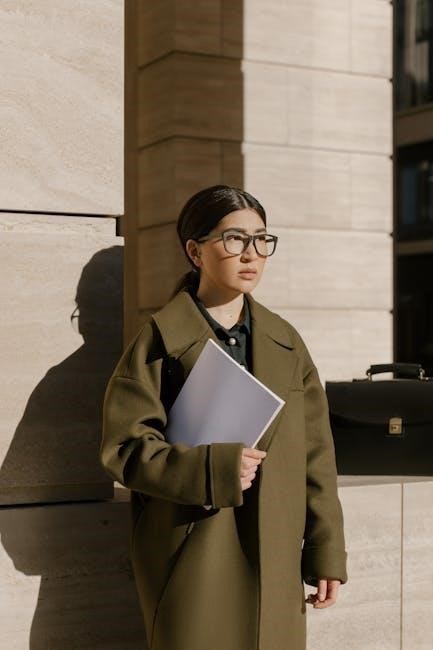building a non anxious life pdf
Summary
Discover how to overcome anxiety and build a peaceful life. Get your free PDF guide to calm living and start thriving today!

Discover a transformative guide to reducing anxiety and fostering peace. Dr. John Delony’s expertise blends personal experience and research, offering practical strategies for a resilient, non-anxious life.
Overview of the Book and Its Purpose
Building a Non-Anxious Life by Dr. John Delony is a comprehensive guide designed to help individuals reduce anxiety and cultivate a life of peace and resilience. The book focuses on six daily choices—embracing reality, cultivating connection, pursuing freedom, prioritizing health, practicing mindfulness, and strengthening belief—that serve as the foundation for a non-anxious life. Dr. Delony, leveraging his expertise in mental health and personal experiences, provides practical strategies and actionable tools to address anxiety. The book is structured to empower readers to understand anxiety as an alarm system rather than an identity, offering a step-by-step approach to building emotional strength and stability. It is a valuable resource for anyone seeking to navigate modern life with calmness and confidence.
The Author’s Background and Expertise
Dr. John Delony, a renowned mental health expert and bestselling author, brings extensive experience and qualifications to the topic of anxiety. Holding two PhDs—one in counselor education and supervision, and another in higher education administration—Dr. Delony has spent nearly two decades in higher education, serving in various leadership roles. His expertise is further enriched by his personal journey with anxiety, which informs his compassionate and practical approach. As the author of Building a Non-Anxious Life and the follow-up to his acclaimed book Redefining Anxiety, Dr. Delony is dedicated to helping individuals understand and overcome anxiety through actionable strategies and emotional resilience. His work is deeply rooted in research, personal experience, and a commitment to fostering mental well-being.

Understanding Anxiety in Modern Life

Anxiety is pervasive in modern life, often fueled by societal pressures and chaotic lifestyles. It acts as an alarm system, signaling threats to our well-being.
The Prevalence of Anxiety in Society
Anxiety has become a pervasive issue in modern society, with nearly half of the U.S. population reporting that their lives are significantly impacted by anxiety, stress, or burnout. This widespread mental health challenge is exacerbated by the fast-paced, high-pressure nature of contemporary life. Anxiety affects individuals across all demographics, influencing their emotional well-being, relationships, and daily functioning. It is not merely a personal struggle but a societal issue that demands attention and understanding. Recognizing the prevalence of anxiety is the first step toward addressing it effectively and fostering a non-anxious life for individuals and communities alike.
The Role of Anxiety as an Alarm System
Anxiety serves as a natural alarm system, signaling potential threats and triggering responses to ensure survival. While it was once crucial for reacting to danger, modern life often activates this system unnecessarily. Anxiety isn’t the enemy but a misunderstood ally. It alerts us to unaddressed issues, urging us to take action. However, when it becomes chronic, it disrupts daily life and well-being. Understanding anxiety’s role as an alarm helps reframing it as a signal for intervention rather than a constant state of being. By addressing the underlying causes, individuals can learn to manage anxiety effectively, distinguishing between false alarms and genuine threats. This perspective empowers people to harness anxiety’s purpose without being controlled by it.
The Six Daily Choices for a Non-Anxious Life
Embracing reality, cultivating connection, pursuing freedom, prioritizing health, practicing mindfulness, and strengthening belief are six essential daily choices to reduce anxiety and foster peace and confidence.
Choice 1: Embracing Reality
Embracing reality is the first step toward a non-anxious life. It involves accepting life as it is, rather than resisting or denying challenges. Dr. John Delony emphasizes that anxiety often arises from our refusal to acknowledge difficult truths. By choosing to face reality head-on, we reduce the mental tension caused by avoidance. This choice fosters self-awareness, honesty, and the courage to address problems directly. It’s not about passively accepting hardship but engaging with it in a way that promotes growth. Embracing reality creates a foundation for the other five choices, helping us build resilience and move forward with clarity and peace.
Choice 2: Cultivating Connection

Cultivating connection is vital for a non-anxious life. Anxiety often thrives in isolation, making meaningful relationships essential for emotional well-being. Dr. John Delony highlights that connecting with others fosters a sense of belonging and support, reducing feelings of loneliness and fear. This choice involves nurturing relationships with family, friends, and community, as well as being vulnerable and open with others. By prioritizing connection, we build a network that helps us navigate life’s challenges with resilience. It also encourages us to invest in others, creating a cycle of care and understanding. Cultivating connection reminder that we are not alone and that shared experiences strengthen our ability to face anxiety with courage and hope.
Choice 3: Pursuing Freedom
Pursuing freedom is a cornerstone of building a non-anxious life. Dr. John Delony emphasizes that true freedom lies in releasing oneself from the grip of anxiety and embracing a life of purpose and joy. This choice involves letting go of fear, self-doubt, and societal expectations that weigh us down. By pursuing freedom, individuals can break free from emotional burdens and mental constraints, allowing them to live authentically. Freedom fosters resilience, enabling us to face challenges with courage rather than being controlled by anxiety. It also encourages us to redefine success on our own terms, creating a life that aligns with our values and aspirations. Pursuing freedom is not just a choice; it’s a journey toward liberation and lasting peace.
Choice 4: Prioritizing Health
Prioritizing health is essential for reducing anxiety and building a non-anxious life. Dr. John Delony highlights the importance of caring for both physical and mental well-being. Neglecting health can exacerbate anxiety, while investing in it creates resilience. Regular physical activity, a balanced diet, and sufficient sleep are foundational to emotional stability. By focusing on health, individuals can better manage stress and reduce anxiety triggers. This choice also involves setting boundaries to protect one’s energy and time, ensuring a sustainable lifestyle. Prioritizing health empowers us to face challenges with strength and clarity, fostering a life of peace and vitality. It’s a daily commitment that lays the groundwork for long-term emotional and mental well-being.
Choice 5: Practicing Mindfulness
Practicing mindfulness is a powerful tool for reducing anxiety and cultivating a non-anxious life. By focusing on the present moment, individuals can break free from the cycle of worry and fear. Mindfulness involves non-judgmental awareness of thoughts, emotions, and sensations, helping to ground oneself in reality. Simple practices like meditation, deep breathing, or mindful movement can significantly reduce stress and anxiety. Dr. John Delony emphasizes that mindfulness is not about achieving perfection but about consistently showing up to the present. Over time, this practice builds emotional resilience, allowing individuals to respond to challenges with clarity rather than reactivity. Mindfulness complements the other daily choices, creating a holistic approach to lasting peace and well-being. It’s a transformative habit that fosters calm in the midst of chaos.

Choice 6: Strengthening Belief

Strengthening belief is a foundational choice for building a non-anxious life. It involves cultivating faith in something greater than oneself, whether that’s a higher power, personal values, or a sense of purpose. Dr. John Delony highlights that belief provides stability and direction, helping individuals navigate life’s uncertainties with confidence. By grounding oneself in core beliefs, one can resist the pull of anxiety and fear. This choice encourages practices like reflection, prayer, or meditation to deepen inner conviction. Strengthening belief fosters resilience, enabling individuals to trust in their ability to handle challenges. It’s not about avoiding difficulties but facing them with a sense of security and hope. This daily choice aligns with the others, creating a robust framework for a peaceful and purposeful life.

Practical Strategies for Reducing Anxiety
Physical activity, healthy eating, and mindfulness practices are key strategies to reduce anxiety. These habits foster emotional strength and resilience, helping to create a calm, non-anxious life.

The Importance of Physical Activity

Physical activity is a powerful tool for reducing anxiety. Exercise releases endorphins, which improve mood and reduce stress. Regular movement helps regulate emotions and builds resilience, fostering a non-anxious life by creating a healthy distraction from worries and enhancing overall well-being. Dr. John Delony emphasizes that physical activity not only strengthens the body but also calms the mind, making it easier to manage anxiety and respond to challenges with clarity and confidence. Incorporating exercise into daily routines can lead to significant improvements in mental health, promoting a more balanced and peaceful lifestyle. By prioritizing physical health, individuals can better navigate life’s stressors and cultivate lasting calm.
Adopting a Healthy Diet
A healthy diet plays a crucial role in reducing anxiety and promoting mental well-being. Foods rich in nutrients, such as whole grains, fruits, vegetables, and lean proteins, support brain health and stabilize emotions. Omega-3 fatty acids found in fish and nuts can reduce anxiety symptoms, while antioxidants in berries and leafy greens combat oxidative stress. Avoiding processed foods, sugary snacks, and excessive caffeine can prevent mood swings and energy crashes. Staying hydrated is equally important, as dehydration can exacerbate anxiety. By fueling your body with nourishing foods, you create a strong foundation for managing stress and building a non-anxious life. A balanced diet not only improves physical health but also enhances mental clarity and emotional stability, making it easier to navigate life’s challenges with confidence.
Using Mindfulness and Somatic Practices
Mindfulness and somatic practices are powerful tools for reducing anxiety and cultivating calm. Mindfulness, the practice of being fully present in the moment, helps quiet the mind and reduce worry about the future or regrets about the past. Techniques like deep breathing, meditation, and grounding exercises can help individuals reconnect with their bodies and emotions, fostering a sense of stability. Somatic practices, such as yoga, progressive muscle relaxation, and mindful movement, address physical tension stored in the body, which often accompanies anxiety. By combining these methods, individuals can release pent-up stress and develop greater body awareness. These practices encourage self-regulation, helping to calm the nervous system and build resilience against anxiety. Regular mindfulness and somatic exercises create a foundation for emotional and physical well-being, empowering individuals to navigate life’s challenges with greater ease and confidence.